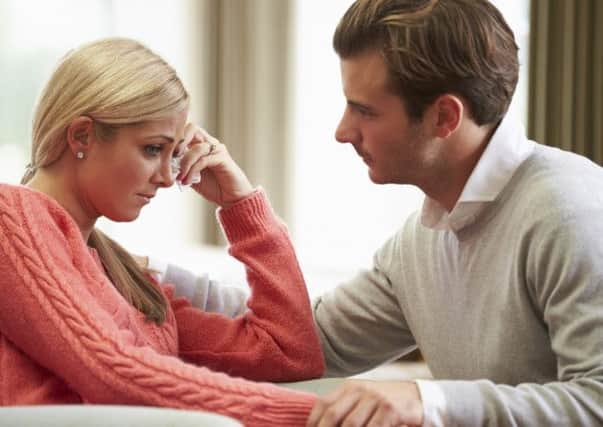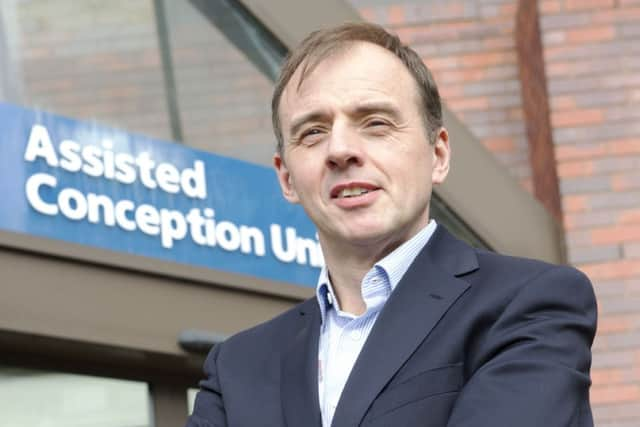The heartbreak of couples struggling to start a family
This article contains affiliate links. We may earn a small commission on items purchased through this article, but that does not affect our editorial judgement.


Parents up and down the country doubtless recalled the precious moment they too left hospital holding their newborn babies - full of happiness and excitement ready to embark on family life.
But for the one in seven couples in the UK suffering from infertility, that moment is an unattainable dream often made all the more heartbreaking by insensitive comments from family and friends.
Advertisement
Hide AdAdvertisement
Hide AdStories of miracle IVF babies, and couples trying to have children for years only to fall pregnant with triplets, make headline news - but only one in three couples undergoing fertility treatment actually achieves the fairytale ending.


Jonathan Skull is a consultant in reproductive medicine and surgery and clinical head of the Assisted Conception Unit at the Royal Hallamshire Hospital’s Jessop Wing in Sheffield, which offers IVF and other fertility treatments. Every year the unit receives 1,000 referrals mainly from patients living in Sheffield.
He said: “The emphasis this year for National Fertility Awareness Week is on talking about the problem. It’s still very much a taboo subject.
“A lot of people view having children as a lifestyle choice but infertility is a disease. Everyone deserves the right to try to be a parent and people need to accept infertility is a disease that warrants treatment.”
Advertisement
Hide AdAdvertisement
Hide AdIn 2004 the National Institute for Clinical Excellence - NICE - issued guidelines recommending eligible women under 40 be offered three IVF cycles funded by the NHS. One cycle costs around £3,000.
But very few Clinical Commissioning Groups have implemented the guidelines, creating a postcode lottery.
In Sheffield, patients are entitled to only one. Residents of Rotherham, Doncaster and Barnsley receive two, and those in Bassetlaw get three.
Mr Skull said: “It’s very disappointing NICE came up with these guidelines in 2004 and the situation hasn’t changed in 10 years.
Advertisement
Hide AdAdvertisement
Hide Ad“New guidelines were published last year, still recommending three cycles, but a significant number of CCGs don’t fund them despite the fact it’s a very effective treatment.
“It’s not that expensive and the improvement in quality of life is significant. I see a lot of couples who just can’t afford to carry on. Some have got a very good prognosis but they can’t continue because they just haven’t got the money.
“Most things people get treatment for on the NHS are things affecting their quality of life - we don’t deny those people treatment. If you have gallstones we don’t say, ‘You’ll just have to stop eating fatty food’. We treat patients because it makes them better.
“Having children is a gift and it isn’t a given it will happen, but everyone should be given the chance to try.”
Advertisement
Hide AdAdvertisement
Hide AdThe Assisted Conception Unit carries out 750 cycles of IVF every year, and around one in three is successful.
The chances of success decrease with age.
“Going through treatment can have an effect on the couple even if they are successful, but if you are unsuccessful it can take over your life for years at a time,” said Mr Skull. “It’s all-consuming and hard to move on.
“While patients are having treatment or thinking of their next treatment they can’t think about anything else, and it stops enjoyment of many aspects of their lives. If they are unsuccessful they have to come to terms with the fact their lives have taken a very different turn to the one they were anticipating.”
It’s also an isolating condition. Many patients say they find it hard to be around peers who have children.
Advertisement
Hide AdAdvertisement
Hide Ad“We do see relationships break down and people cutting themselves off from friends and family,” said Mr Skull. “If treatment is unsuccessful many patients can’t face being around people who have children and I think that must be difficult.”
So, what is the best way to support someone suffering from infertility?
“Some people do go down the route of adoption but it isn’t for everyone,” said Mr Skull. “Saying to someone having fertility treatment, ‘Why don’t you just adopt?’ is insensitive and it doesn’t address the issue at all. People try to be helpful and offer advice as to how to get pregnant - everyone is a closet fertility expert - but, if you know someone who is having problems, don’t offer advice. A better approach is to listen.”
Mr Skull said there is normally a medical reason why couples can’t conceive but 25 per cent have ‘unexplained infertility’.
Advertisement
Hide AdAdvertisement
Hide Ad“It’s very frustrating. It doesn’t mean there isn’t a reason, it means we just haven’t found it,” he said.
Dr Zak McMurray, clinical director for NHS Sheffield Clinical Commissioning Group, said: “We conducted a review of our fertility policy in the autumn of 2013, in partnership with the Expert Fertility Panel, and this was adopted in January.
“Our decision to fund one cycle of IVF is based around our overall health priorities for our population and within the financial resources at our disposal.”
Case studies:
Sarah* 26, and John*, 33, from Rotherham, have been trying for a baby for five years.
Advertisement
Hide AdAdvertisement
Hide AdSarah, a teacher, has Polycystic Ovary Syndrome, which can stop the ovaries from producing eggs.
She said: “I don’t think any of us think we’ll have a baby through fertility treatment. It most certainly wasn’t in my plan. I thought it would be all hearts and flowers and would happen naturally.”
After 18 months trying to conceive they were referred to the ACU where they have had three rounds of Intrauterine Insemination - where selected sperm is placed into the uterus at the time of ovulation - and a cancelled cycle of IVF.
“I have had endless tests which all feel extremely intrusive,” said Sarah. “I sometimes spend days crying and think, ‘Why me?’
Advertisement
Hide AdAdvertisement
Hide Ad“I struggle with the fact I am stopping my husband having the family he wants.
“We are a religious couple and we know we’d be great parents, loving and kind. I sometimes wonder why God is making us fight so hard - especially when it happens so easily for others.
“I do find myself withdrawing from family who have had babies. People say, ‘It’ll happen soon’ but they are wrong. No one thinks about what they say and that is hurtful too.”
John added: “We have had a lot of setbacks which have caused her to be distraught with grief and it makes me feel absolutely helpless.
Advertisement
Hide AdAdvertisement
Hide Ad“I can only offer a shoulder to cry on and say, ‘We will get there in the end’, but there is always the nagging thought we might not. No matter what the end result for us, we will come through this together.”
Jenny*, 36, and Steve*, 46, from Rotherham, have been trying to start a family for three-and-a-half years.
Jenny has mild endometriosis - a gynaecological condition where cells from the womb appear outside the uterus and become inflamed causing pain and infertility.
They have had three unsuccessful attempts at IVF and undergone further testing to establish why their embryos aren’t implanting. All the results have been ‘normal’.
Advertisement
Hide AdAdvertisement
Hide AdJenny said: “We never expected IVF to be so emotionally draining. Emotionally, the inability to get pregnant is all-consuming.
“Our lives are on hold and, although we have a nice home, good jobs and a great relationship, it always feels like there is something missing.
“Despite trying to remain positive, each failed IVF attempt eats away at the hope.
“Going through each cycle is a rollercoaster ride, with the excitement there might be a chance it works, followed by the absolute devastation that it has failed.
Advertisement
Hide AdAdvertisement
Hide Ad“Friends try to be supportive but end up saying the wrong thing and, quite often, as they have children or are expecting, I feel very isolated.
“I’m living in torment - I have no answers as to why I can’t get pregnant, I desperately want a family but feel I will never know what it feels like to carry a baby or hold my own in my arms.
“Yes, there is adoption, and we are considering it, but it doesn’t take away the devastation we’ve felt for the last few years.”
*names have been changed to protect the patients’ identities
Facts and figures:
Advertisement
Hide AdAdvertisement
Hide AdInfertility is defined as failure to conceive after one to two years
One in seven heterosexual couples in the UK is affected
In 2011 47,422 women underwent IVF treatment - of those just 25 per cent had a baby - 75 per cent didn’t
40 per cent of IVF cycles were NHS funded, the other 60 per cent were funded privately
In 2011 two per cent of babies were conceived through IVF
Contacts:
Sheffield Infertility Support Group was set up in 2013 to help couples going through fertility treatment. The group meets monthly in Sheffield city centre and new members are welcome. See Sheffield Infertility Support Email: [email protected] Twitter: @SheffieldSIS
The Infertility Research Trust is a Sheffield-based charity, founded in 1982. It holds regular meetings and public information events. See Infertility Research for details.